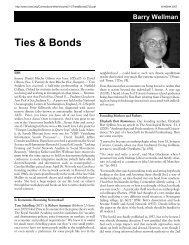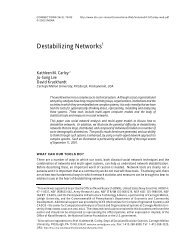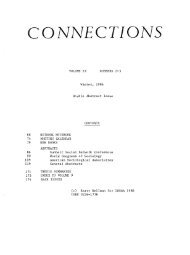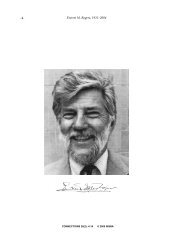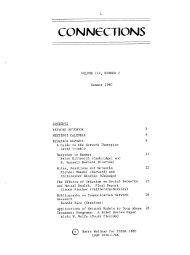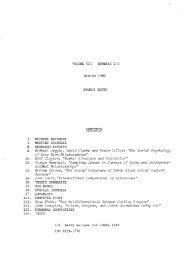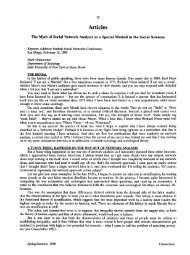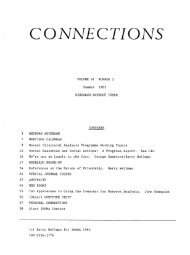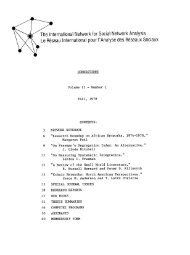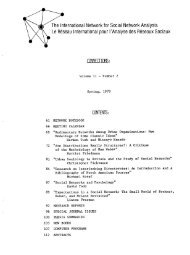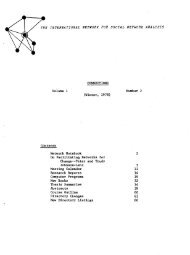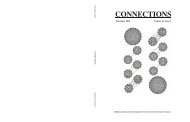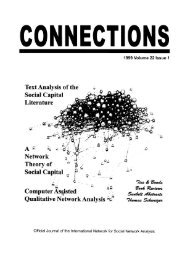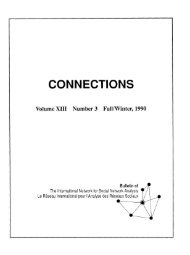Sunbelt XXXI International Network for Social Network ... - INSNA
Sunbelt XXXI International Network for Social Network ... - INSNA
Sunbelt XXXI International Network for Social Network ... - INSNA
You also want an ePaper? Increase the reach of your titles
YUMPU automatically turns print PDFs into web optimized ePapers that Google loves.
Unequal Access To Urban People As A Form Of <strong>Social</strong> Capital: Findings From A Study Of Friendship <strong>Network</strong>s Among Chinese College StudentsTang, Zhenyu; Feld, Scott L.Friendship networks<strong>Social</strong> Capital, Homophily, Friendship Formation, China, college students, inequalityWED.PM1Employment opportunities in China are highly concentrated in large urban areas, and control over those opportunities is there<strong>for</strong>e concentrated in people inthose urban areas. Living in large urban areas oneself and having access to other urban people there<strong>for</strong>e provide indirect access to the greater benefits ofthose large urban places. In particular, college students from large urban areas start with better access than their fellow students. Ties to other students fromlarge urban areas can be a further resource. This study examines factors affecting college students’ ties to others from large urban places. We collected andanalyzed data on about 200 students from Peking University (PKU). We find substantial homophily such that students from large urban areas have morefriends from similar places. We found that common foci of activity and preferences <strong>for</strong> homophily could not account <strong>for</strong> much of this pattern. We foundrelatively small differences in choices of foci of activity, and widely shared preferences <strong>for</strong> associating with urban friends. However, we found that a surprisingnumber of college students maintained friendships in college with people they knew be<strong>for</strong>e college, largely from the same types of backgrounds as themselves.And, we suggest that the required reciprocity of friendship combined with the largely shared preference <strong>for</strong> associating with urban friends means that whileeveryone wants urban friends, urban people are more accepted as friends by other urban students. We conclude with further considerations about the difficultproblem of attempting to provide equal access to social capital.Unique Features Of Corrupt Police <strong>Network</strong>sLauchs, Mark; Keast, RobynCriminals, Gangs, Terrorists, and <strong>Network</strong>sStructure Variation, Dark <strong>Network</strong>sSAT.PM1Not all networks create organisational structures. Recent work has demonstrated that corrupt police networks operate within the shadows of a hostorganisation ‐ the Police Force (Lauchs, Keast and Yousefpour <strong>for</strong>thcoming). Since they operate under the radar, corrupt police networks are argued to be lowdensity, centrality and path distance; a decentralised but non‐linear group <strong>for</strong>med around their roles, but not command structure, within the police agency.This paper compares and contrasts the structural properties and operational practices of generalised criminal networks those with that of a corrupt policenetwork. It draws on data from the Fitzgerald Inquiry into Queensland Police Misconduct and related publications. A preliminary descriptive theory of corruptpolice or blue line networks will be generated.



